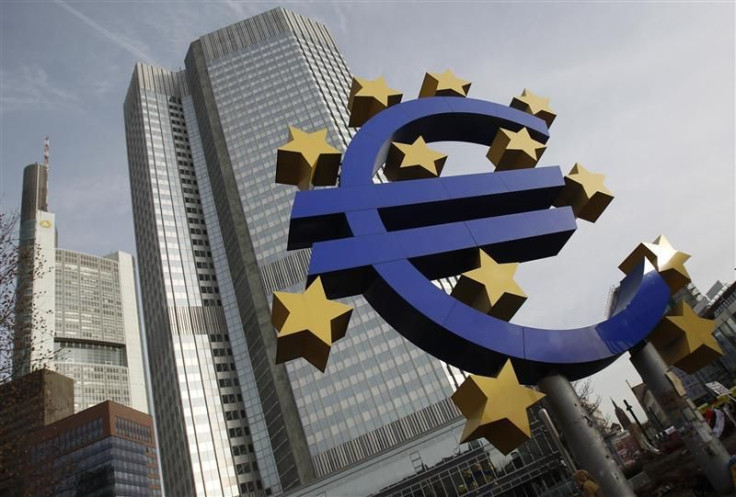ECB Cool on More Bond Buying, Lending to IMF

(REUTERS) - The European Central Bank doused on Thursday hopes it will aggressively ramp up its bond-buying program and allow the Eurozone to lend money to IMF so it can help fight the Eurozone debt crisis.
ECB President Mario Draghi said new forecasts from the central bank showed the currency bloc's GDP could contract by as much as 0.4 percent next year although it could also grow by as much as 1.0 percent.
But he played down expectations the central bank would dramatically increase its debt crisis-fighting measures and revealed the vote to cut rates wasn't unanimous.
The outlook remains subject to high uncertainty and substantial downside risks, Draghi told a news conference after the ECB cut interest rates back to a record low of one percent.
The move came hours before a high-stakes EU summit which will aim to agree on a plan to defuse the crisis, with France and Germany pushing for rule changes to stricter budget discipline in the bloc.
The ECB, which Eurozone officials say has been closely involved in drafting plans for tighter fiscal integration in the bloc, has pressed governments to toughen their budget rules.
Draghi said last week further actions could follow if European leaders agreed on tighter budget controls.
ECB watchers took that to mean the central bank would step up its purchases of the bonds of struggling Eurozone members but he firmly played down that interpretation.
I was surprised by the implicit meaning that was given (to my comments last week), he said.
A new fiscal compact, comprising a fundamental restatement of the fiscal rules together with the fiscal commitments that euro area governments have made, is the most important precondition for restoring the normal functioning of financial markets.
The euro turned negative in response and Italian government bond yields rose.
With Eurozone leaders desperate to build a firewall around their debt-ridden members, another idea that has been floated is for Eurozone central banks to lend to the International Monetary Fund so it could take a more prominent role.
It's legally complex. The spirit of the treaty is that one cannot channel money in a way to circumvent the treaty provisions, Draghi said. If the IMF were to use this money exclusively to buy bonds in the euro area, we think it's not compatible with the treaty.
The rate cut was aimed at buoying the euro zone economy, which economists expect to slide into recession by early 2012.
A Reuters survey of 73 analysts had showed a 60 percent chance the ECB would cut rates by 25 basis points for the second month running, back to the record low of 1.0 percent it reached during the financial crisis in 2009.
Inflation is now forecast to be in a range of 1.5-2.5 percent next year. The ECB's target is close to but below two percent.
3-YEAR BANK SUPPORT
Draghi also said the ECB would start offering banks funding for 3 years for the first time ever, to try to prevent the Eurozone crisis precipitating a credit crunch that would choke the bloc's economy.
Draghi, who took over the reins from Jean-Claude Trichet last month, said a 36-month refinancing operation on Dec. 21 would replace the 12-month funding offer the ECB had planned previously.
The ECB would offer full allotment -- meaning it will meet all bids -- at the two three-year tenders planned and there would be an option of early repayment after a year.
It also made it easier for banks to get its funding by further expanding the menu of assets they can swap for ECB loans.
The ECB has already reinstated some of its most potent crisis-fighting tools in recent months in a bid to calm escalating tensions in bank-to-bank lending markets. Last week it, the U.S. Federal Reserve and a clutch of other top central banks slashed the cost of the dollar loans they offer banks.
But the apparently cool attitude to stepping up its bond-buying program is likely to overshadow that assistance.
France and Italy but also the U.S. and Britain have all put intense pressure on the ECB to use its potentially unlimited firepower to calm the Eurozone's crisis which is now casting a dark cloud over the global economy.
Earlier this week ratings agency S&P warned that its threat of a mass downgrade of Eurozone members would be tough to avoid if larger ECB bond buying wasn't part of Friday's summit deal.
Pressure is getting ever more intense on the central bank to avert a Eurozone meltdown.
A senior Eurozone source said hours before the start of the EU summit that a proposal to give the Eurozone's permanent bailout fund, the European Stability Mechanism, a banking license -- which could allow it to access ECB funds, boosting its firepower -- had been rejected.
The ECB had been uncomfortable about the idea but the jettisoning of another proposal that could have put a firewall around Eurozone debt strugglers puts it ever more firmly in the spotlight to act directly.
(Reporting by Marc Jones/Paul Carrel; writing by Mike Peacock; editing by Chris Pizzey)
© Copyright Thomson Reuters {{Year}}. All rights reserved.





















